Batteries
Storage batteries are the heart of all self-consumption, off-grid and back-up wind/PV or inverter electrical systems. Their function is to balance the outgoing electrical requirements with the incoming power supply. They offer a reliable source of electricity which can be used when solar or wind power is not available. Batteries are able to provide short term power output many times higher than the charging source output.
-
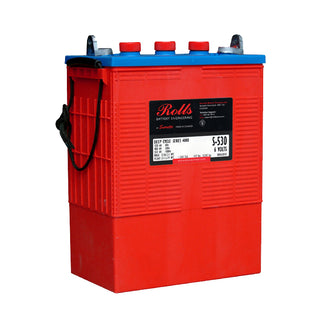
Rolls 4000 Series
Durable batteries designed for deep cycling service in renewable energy applications. Thick plate design with high density active material and increased liquid reserve. Polypropylene rigid container construction. Supplied fully charged.
-
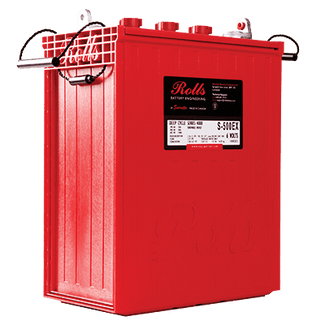
Rolls 4500 Series
The Rolls 4500 series combines the convenience and portability of the 4000 series, with the extended capacity and cycle life found in the heavy duty 5000 series batteries. They provide a battery with good cycle life at a great price.
-
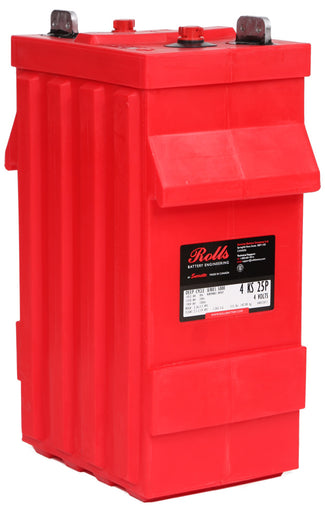
Rolls 5000 Series
These heavy duty batteries are designed for unsurpassed repeated deep cycling service in renewable energy applications. Thick plate design with high density active material and increased liquid reserve. Several 2V cells are pre-assembled together to give higher voltage blocks. These in turn are connected to form a battery bank with appropriate voltage and capacity. Unique battery design features dual container construction. Removable cells are fitted with a durable case giving double protection against breakage or leakage. Easy on-site assembly with no special tools or skills requires. Supplied fully charged with inter-connectors. Self Discharge: ~2-3% per month.
-
Lead Acid Batteries
Shop all - Maintenance free
- High energy density: more energy with less weight
- High charge currents (shortens the charge period)
- High discharge currents (enabling for example electrical cooking on a small battery bank)
- Long battery life (up to six times the battery life of a conventional battery)
- High efficiency between charging and discharging (very little energy loss due to heat development)
- Higher continuous power available
- A lead-acid battery can fail prematurely due to sulphation if it is left partially charged, fully discharged, or rarely fully charged for long periods of time.
- A Lithium-ion battery does not need to be fully charged, has a wide operating temperature range and excellent cycling performance.
- They are therefore the battery for very demanding applications.
- The typical energy efficiency (energy that can be taken out of the battery compared to energy required to re-charge) for lead acid batteries is ~ 80%.
- For a Li-ion battery it is ~ 92%
- The final 20% charge for a lead-acid battery is particularly inefficient with efficiencies of ~ 50% and can take a very long time for the battery to become completely charged.
- In contrast a Li-ion battery can still achieve 90% efficiency and so can be fully charged more quickly and using les energy.
- Li-ion batteries save up to 70% in space and 70% in weight compared to lead-acid.
- Li-ion batteries are expensive when compared to lead-acid, but can be compensated for by longer service life, size or weight considerations, superior reliability & efficiency.
- It is vital that the correct battery management system (BMS) is used to control the battery charging. This is important to actively balance the individual cells that make up the battery and prevent under or over voltage which can otherwise destroy the battery.
-
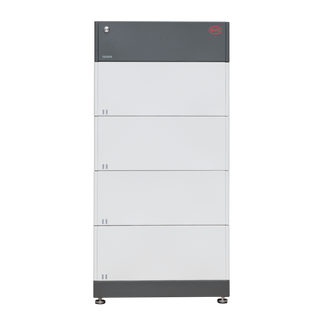
BYD Battery-Box Premium HVS/HVM
The BYD Battery-Box Premium HVS and HVM are modular high voltage lithium iron phosphate (LFP) battery packs for use with an external inverter.
-
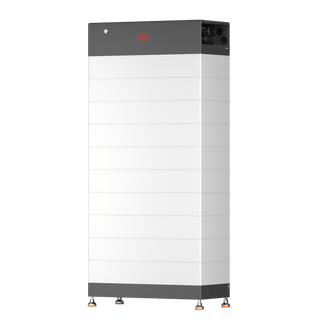
BYD Battery-Box HVB
The BYD Battery-Box HVB is the first residential/small commercial battery storage system featuring the renowned BYD Blade Battery technology. The BYD HVB offers high levels of performance, efficiency, energy density and safety. The HVB's flexible expandable design allows additional modules to be added at anytime and at any SOC (state of charge). Up to 3 towers can be connected in parallel for increased capacity.
-
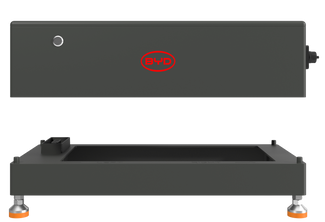
BYD Battery-Box BCU+ for HVB/HVS+/HVM+
The BCU+ consists of the BCU (top), base and feet for BYD HVB, HVS+ and HVM+ modules. 1 BCU+ is required per tower.
-
Lithium Batteries
Shop all
Lead Acid Batteries
Lithium Batteries
Lithium-ion (Li-ion) batteries have several advantages over conventional lead-acid batteries:
Read more
Rugged
Efficient
Size & Weight
Expensive?
Battery Management System





